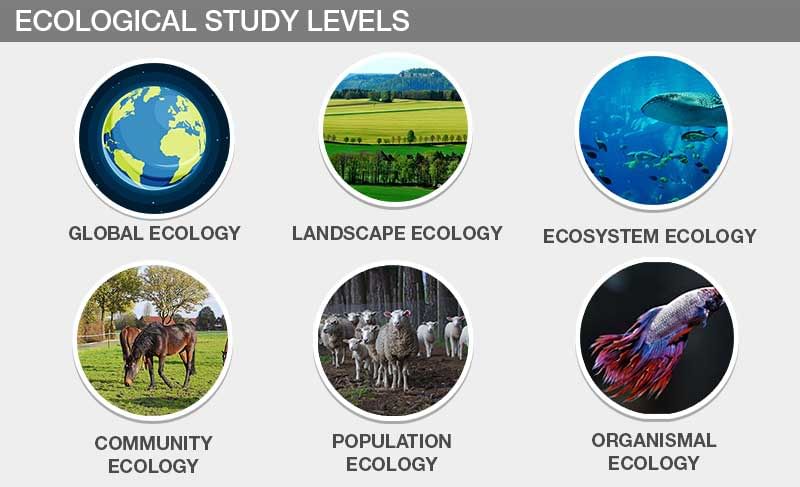Ecology and its relevance to man | NABARD Grade A & Grade B Preparation - Bank Exams PDF Download
| Table of contents |

|
| Ecology |

|
| Biotic and Abiotic Factors |

|
| Types of Ecology |

|
| Importance of Ecology |

|
Ecology
Ecology is a branch of science encompassing various dimensions, from the intricacies of human existence to the broader spectrum of populations, communities, ecosystems, and the biosphere. This science revolves around the intricate interplay between organisms, their surroundings, and the dynamic relationships that bind them. At its core, ecology strives to illuminate life processes, adaptability, habitats, interactions, and the remarkable diversity of organisms within our world. In this article, we delve into the multifaceted concept of ecology, exploring its types, significance, and real-world examples.

Biotic and Abiotic Factors
The primary goal of ecology is to gain insight into how both living (biotic) and non-living (abiotic) elements are distributed among living organisms in their surroundings, and how these elements interact with the environment.
- Biotic Components: Biotic components encompass all the living elements within an ecosystem. Examples of biotic components consist of organisms like bacteria, animals, birds, fungi, and plants.
- Abiotic Components: Abiotic components encompass the non-living chemical and physical factors that make up an ecosystem. These components can be derived from the atmosphere, lithosphere, and hydrosphere. Abiotic elements include things like sunlight, soil, air, moisture, minerals, and more.
Living organisms are categorized as biotic components, while non-living elements such as sunlight, water, and topographical features fall under the category of abiotic components.
Types of Ecology
 Ecology encompasses various specialized branches that shed light on distinct aspects of the environment and its inhabitants.
Ecology encompasses various specialized branches that shed light on distinct aspects of the environment and its inhabitants.
These branches include:
- Global Ecology: This field explores the interactions between Earth's ecosystems, including the land, atmosphere, and oceans, shedding light on large-scale interactions and their impact on the planet.
- Landscape Ecology: Landscape ecology examines the flow of energy, materials, organisms, and other ecosystem products. It also investigates the role of human activities in shaping landscape structures and functions.
- Ecosystem Ecology: Ecosystem ecology delves into the complete ecosystem, encompassing both living and non-living components and their relationships with the environment. It is concerned with understanding how ecosystems function and the dynamics of their interactions.
- Community Ecology: Community ecology explores how interactions among different species influence the structure of a community. It involves studying populations of various species living together in a specific geographic area.
- Population Ecology: Population ecology focuses on the factors that influence the genetic composition and size of populations. Ecologists in this field investigate fluctuations in population size, growth, and interactions within the population.
- Organismal Ecology: Organismal ecology examines the behavior, morphology, and physiology of individual organisms in response to environmental challenges. This branch explores how organisms interact with both living (biotic) and non-living (abiotic) aspects of their environment.
- Molecular Ecology: Molecular ecology studies the production of proteins and how these proteins impact organisms and their surroundings at a molecular level. It delves into the role of DNA in forming proteins, which in turn influence an organism's interactions with the environment.
Importance of Ecology
Ecology plays a pivotal role in our understanding of the environment and our coexistence within it.
Here are some compelling reasons highlighting its importance:
- Preservation of the Environment: Ecology helps us comprehend the impact of our actions on the environment, making us aware of the extent of harm we can inflict.
- Preventing Environmental Degradation: Ignorance of ecological principles has caused the deterioration of land and the environment, and has endangered and caused the extinction of various species, such as dinosaurs, white sharks, and mammoths. Consequently, studying ecosystems and organisms equips us to safeguard them from harm and peril.
- Efficient Resource Management: Ecology knowledge enables us to identify the resources essential for the survival of different organisms. A lack of this knowledge has led to resource scarcity and competition.
- Energy Conservation: All living organisms require energy for their growth and development. Without a proper understanding of ecology, there's a risk of over-exploiting energy resources like light, nutrients, and radiation, ultimately depleting them. A sound grasp of ecological needs prevents the unnecessary waste of energy resources, preserving them for future use.
- Promoting Eco-Friendly Practices: Ecology promotes living in harmony with other species and encourages adopting lifestyles that safeguard the balance of life in the ecosystem.
Examples of Ecology
In the realm of ecology, several examples illustrate its application:
- Human Ecology: This field focuses on the intricate relationship between humans and the environment, highlighting the impact of human activities on the ecosystem and offering insights into improving the well-being of both humans and the environment.
- Niche Construction: This area of study delves into how organisms modify their environment for their own benefit and the benefit of other living beings, exemplified by the impressive mound-building activities of termites.
Ecology is a dynamic and multifaceted science that continually enriches our understanding of the world around us. It provides invaluable insights into the delicate balance of life on Earth and the complex web of interactions that sustain it. By exploring the diverse branches of ecology and recognizing its importance, we are better equipped to make informed decisions to safeguard our environment and promote sustainable coexistence.
|
847 videos|1297 docs|420 tests
|
FAQs on Ecology and its relevance to man - NABARD Grade A & Grade B Preparation - Bank Exams
| 1. What are the differences between biotic and abiotic factors in ecology? |  |
| 2. What are the different types of ecology that exist? |  |
| 3. Why is ecology important in understanding the natural world? |  |
| 4. How does ecology relate to human beings and their activities? |  |
| 5. How can studying ecology help in preparing for the UPSC exam? |  |





















